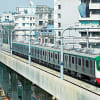Yet another meaningless tragedy

It was supposed to be a time of festivities and reunions amid the holidays, but for many, it turned into one of unimaginable tragedy. On Monday, while the country was observing Nabami, at least 17 people died when a freight train, ignoring the signal light, rammed into a passenger train near the Bhairab Bazar Junction Railway Station. We must ask: how many more ordinary people will have to die in such meaningless tragedies before the authorities do something about it?
Survivors of the Bhairab crash recalled how gruesome the collision was. Reshma Begum, one of the injured, told Prothom Alo how her carriage was crammed with passengers. When tragedy struck, people fell on top of one another, causing so much pressure that it was hard to even breathe. Some couldn't bear the impact, succumbing to their injuries, while others stayed trapped in the mangled carriages, praying for a miracle. It took about 15 hours to end the rescue operations.
Many dreams were thus shattered. Some of the victims were planning to go abroad, some were looking to get married, while some were waiting to meet their loved ones. Shanti Rani Shil, who was on her way to celebrate Durga Puja in Narsingdi, is now mourning the loss of her husband. Many, like Opu, a teenage passenger, were seen frantically searching for their friends and relatives amid the debris.
After the incident, Bangladesh Railway suspended the freight train's driver, his assistant, and guard following a preliminary investigation. But will such measures prevent future accidents? Unfortunately, history indicates otherwise. Train accidents, large and small, are anything but rare in our country, and some common threads link them all – negligence, recklessness, dysfunction, and mismanagement. On April 16, a Dhaka-bound passenger train hit a freight train in Cumilla, injuring 30, following an anomaly in the signalling system. In 2019, two intercity trains collided in Brahmanbaria, killing 16 people and injuring over 70; the incident happened while changing tracks.
Here's another clear pattern: the crashes happen mostly at junctions or crossings, and while switching tracks. And it is with this information that we can plan to save lives. What the authorities need to do is properly prepare conductors, drivers and assistants for their duty, making sure that there is no room for negligence. Additionally, regular maintenance of switches, signals, and the whole technical system is imperative. With these overarching measures, we can at least hope that our loved ones will not be victims of such avoidable tragedies.


 For all latest news, follow The Daily Star's Google News channel.
For all latest news, follow The Daily Star's Google News channel. 









Comments